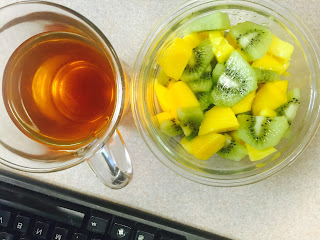Many new to a raw food diet find it hard to decide what to eat for breakfast. Most people are so used to eating dead foods, heated foods, or dense foods when they do eat breakfast, that just thinking about raw food for breakfast can be intimidating. Truth is, raw breakfasts are usually healthier for you, and can also be very simple to make.
Why breakfast?
Eating within an hour or 2 of waking can make a difference in the way you metabolize glucose, or blood sugar, all day. Your glucose level rises every time you eat, and your pancreas produces insulin to shuttle the glucose into your cells, where it’s used for energy. Research is finding that keeping glucose and insulin in the right balance has important effects on metabolism and health.
Many nutrition doctors and professors believe that after eating a healthy breakfast your blood sugar increases a little bit, but that it takes a while for your body to absorb the food. This keeps you from feeling hungry longer.
If you don’t eat breakfast, though, the prolonged fasting might lead to a bigger than normal boost in “hunger hormones” such as ghrelin, encouraging you to overeat at your next meal and leading to spikes and dips in glucose. Over time, if your pancreas is constantly producing insulin to compensate for high levels of glucose, it will burn out and you may develop diabetes.
What to eat?
What to eat?
 After a meal, blood goes to the digestive system and away from the muscles, brain and other systems. After a big, complex meal most of the body’s blood goes to the digestive process and there is not enough oxygen for the brain– which is why you fall asleep after a big meal.
After a meal, blood goes to the digestive system and away from the muscles, brain and other systems. After a big, complex meal most of the body’s blood goes to the digestive process and there is not enough oxygen for the brain– which is why you fall asleep after a big meal. So, what you eat is important. If your idea of breakfast is a doughnut and a cup of coffee, or sugary cereal and a glass of fruit juice, or even pancakes, bacon, and eggs, you’re setting the stage for metabolic havoc. Fortunately, breakfast can be full of flavor as well as healthy
Food combining:
Fruits and vegetables, which are mostly water, take a short time in the digestive tract. The more complex, dense foods you eat at a meal, the longer digestion takes. If in the system too long, sugars and starches can ferment and proteins can putrefy. For this reason the optimum meal is the mono-meal: eating one food at a time. If you wish to eat more than one food at a time, it is good to know how to combine foods so that a meal requires as little blood for digestion as possible. This frees up more fuel and oxygen for the muscles, nervous system and brain. Correct combinations also encourage proper digestion, assimilation and elimination of food eaten.
- Eat fruit alone (an exception is acidic fruits- citrus and tomatoes- which will combine with vegetables and fats.
- Eat melons alone
- Don’t combine starches with acids or sugars (such as bread with tomatoes or sweet pastries)
- Don’t combine proteins with starches
- Try water or tea before your meal
- Try to reduce or eliminate eating between meals
Give it a try
Try a green smoothie, or a cup of plain goat or sheep milk yogurt with berries for a satisfying first meal of the day. Even a small vegetable salad gives your body enough boost to help start your day. Vegetable salads are nutrient rich to boot! Breakfast doesn't have to be, and shouldn't be difficult or too dense, but it can be delicious and healthy.